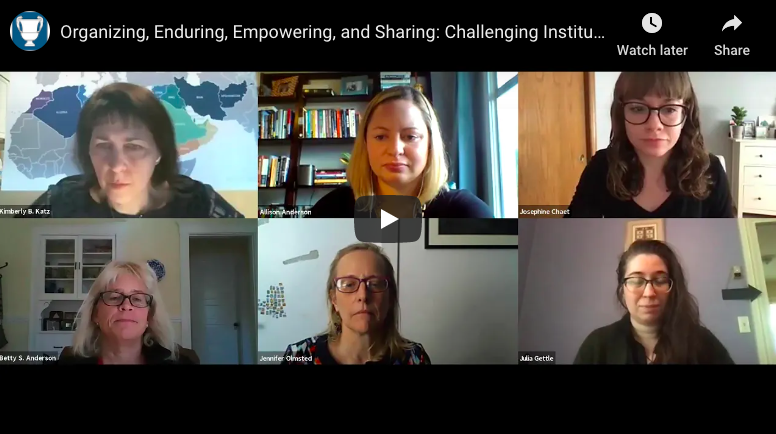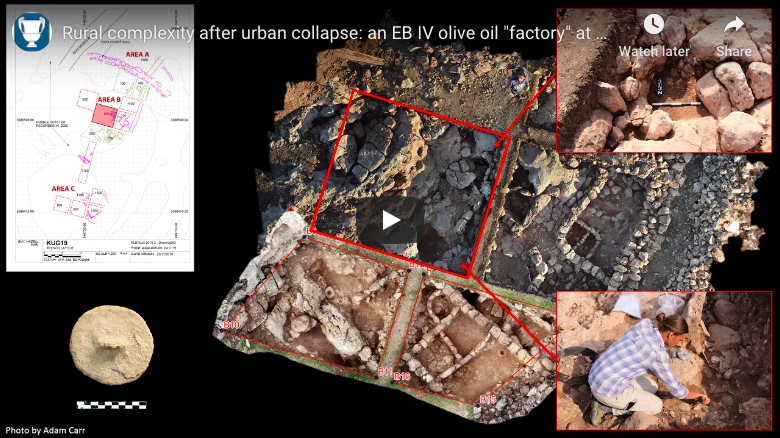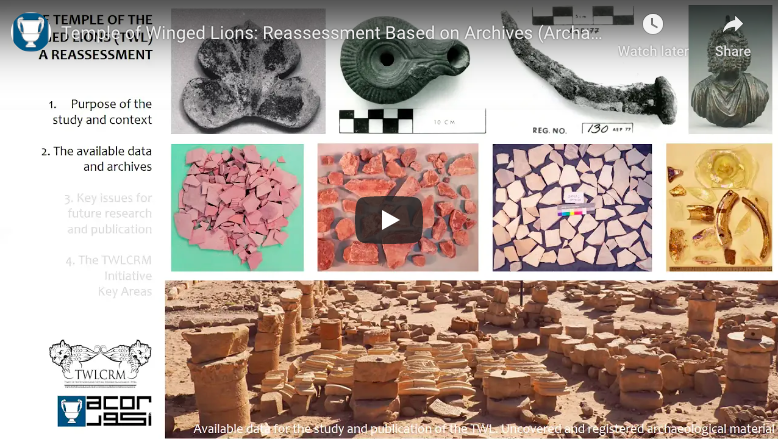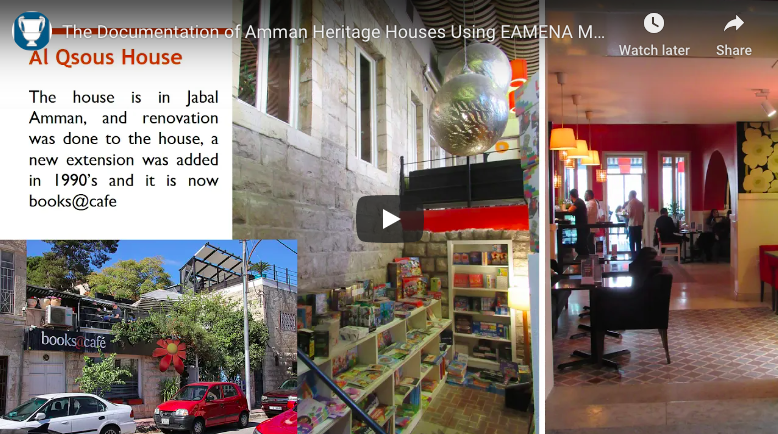This page is continuously updated, so please check back soon for more information about upcoming presentations. For consistent notification of the latest news and events, sign up for our mailing list.
Most of our events are held at our center in Amman (click here for directions). If located elsewhere, this will be stated clearly in the announcement. If you missed a lecture, most are also posted on our YouTube channel a few days after.
updated 22 October 2024
2024 Fall LECTURE SERIES
(updated 22 October 2024)
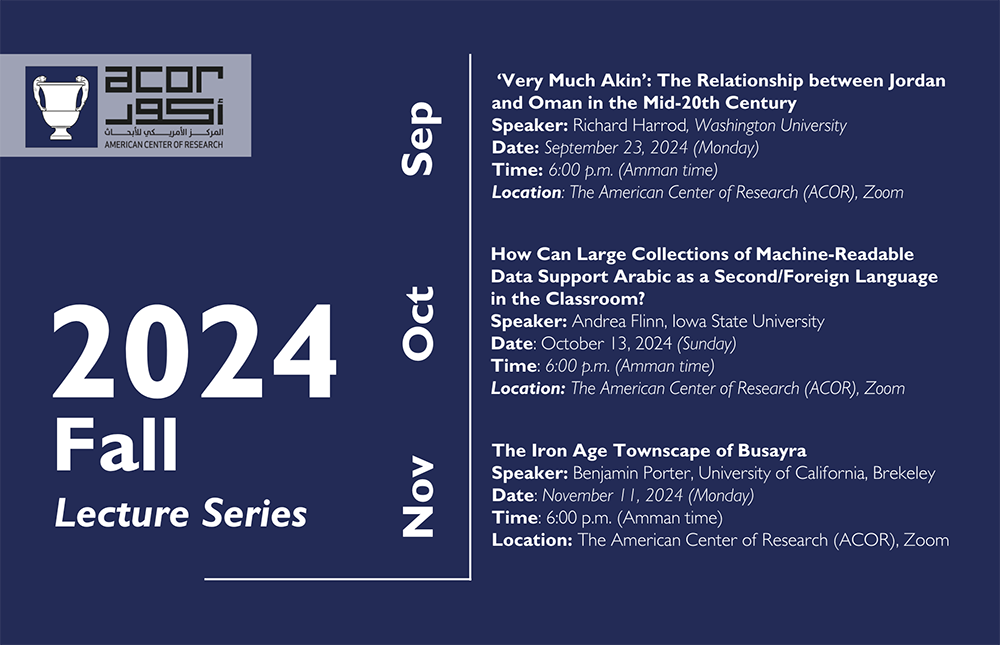
POSTPONED:
New date will be announced when available.
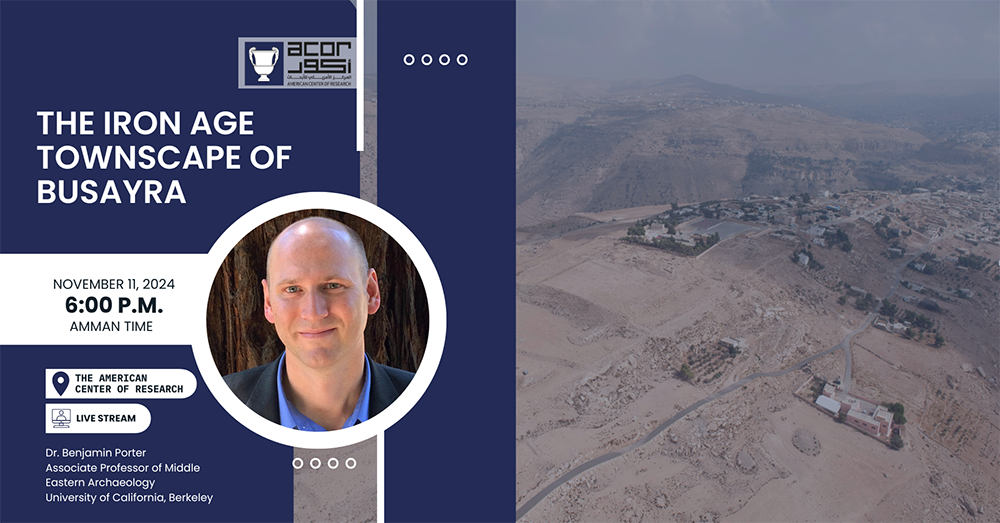
The Iron Age Townscape of Busayra
This talk draws together past and recent research on the Iron Age townscape of Busayra, widely believed to be the administrative capital of the kingdom of Edom. Excavations during the 1970s revealed a suite of monumental public architecture and residential neighborhoods on the settlement’s summit. Recent research carried out by the speaker and his colleagues have returned to these partially documented buildings to better understand their role in the settlement and in the broader region. Geophysical research in unexcavated areas have determined that these were part of a larger townscape awaiting further study. This talk will describe these new discoveries as well as discuss opportunities to continue site development and community engagement activities in the future.
About the Speaker:
Benjamin W. Porter is an associate professor of Middle Eastern archaeology in the University of California, Berkeley’s Department of Middle Eastern Languages and Cultures. An archaeologist and anthropologist, Porter investigates the Bronze and Iron Age societies of the ancient Levant. He has carried out archaeological excavations at Dhiban and Busayra in Jordan. His research has been supported by the National Science Foundation, the National Endowment for the Humanities, the American Philosophical Society, and the Max Van Berchem Foundation, among others.

NEW DATE!
How Can Large Collections of Machine-Readable Data Support Arabic as a Second/Foreign Language in the Classroom?
13 October 2024
6:00 p.m. Amman Time
Join us via Zoom (Webinar ID: 914027 — Passcode:875 6265 1405); international numbers available: https://us02web.zoom.us/u/kbKvDW3fbj
Watch the YouTube livestream
Arabic language instruction has traditionally focused on Modern Standard Arabic, but there is growing demand for proficiency in the Arabic dialects among students and employers, including the Levantine dialect spoken in Jordan, Lebanon, Palestine, and Syria. Empirically based pedagogical materials must be further developed to meet this need, and analyzing large collections of machine-readable texts can facilitate the identification of the most frequently used vocabulary, informing materials creation.
To ensure that the multi-million-word collection that she has built faithfully represents the Levantine dialect, Andrea Flinn has interviewed experts who create content in the dialect, including an author, a scholar, an oral historian, a director, a musician, two cartoonists, two founders of language institutes, and a YouTuber, podcaster, and playwright. To gain perspective on how the dialect is typically used in everyday life, she had 16 proficient speakers take detailed notes on how they used the dialect over a four-hour period. The interview and survey results informed the composition of her collection, which features conversations, online written interactions, songs, and YouTube videos. Analysis of this collection can lead not just to the identification of the most frequently used vocabulary, but it can also inform the development of curricula, graded readers, frequency dictionaries, and listening libraries, allowing learners to gain proficiency more efficiently and affordably.
About the Speaker:
Andrea Flinn in a PhD candidate studying applied linguistics and technology at Iowa State University, with a focus on corpus linguistics, which involves the study of language through large collections of machine-readable texts. She has earned a bachelor’s degree in communications from Cornell University, a master’s degree in teaching English to speakers of other languages from San Francisco State University, and a master’s degree in Arabic from Middlebury College. She has been able to study Modern Standard Arabic and Levantine Arabic with the generous funding of fellowships from the Fulbright Program, the Boren Awards, and the Center for Arabic Studies Abroad (CASA). She hopes to use her skills in technology and Arabic to support English and Arabic language learners in the United States.
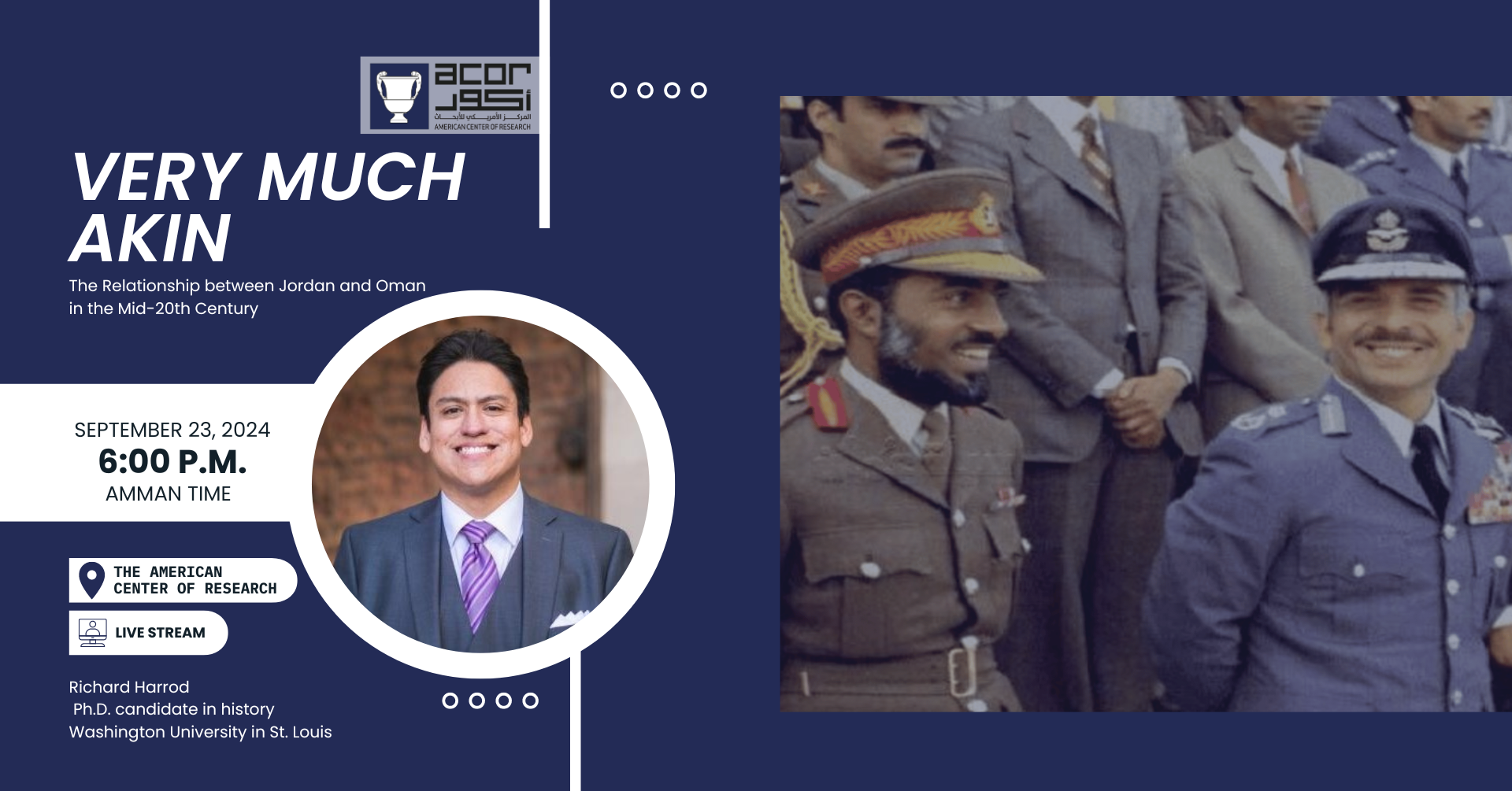
“Very Much Akin”:
The Relationship between Jordan and Oman in the Mid-20th Century
23 September 2024
6:00 p.m. Amman Time
Watch the recording on our YouTube channel
The relationship between Jordan and Oman goes back to the mid-1950s but is little known beyond a handful of specialists. This lecture explores the fascinating political and military history between these two polities over the course of the mid-20th century. Jordan took the side of the Omani rebels during the Jabal Akhdar War (1957–1959), supporting their claims of sovereignty at the United Nations against the Sultan of Muscat. However, over a decade later, Jordan came to the defense of the Sultanate during its fight against communist revolutionaries in region of Dhofar (1964–1975).
The change in policy was due, in part, to the close personal connection between King Hussein of Jordan and Sultan Qaboos bin Sa‘id, who took over Oman in 1970. The two men knew each other and were fellow Royal Military Academy Sandhurst (UK) alumni. However, Jordan also aided Oman because of changing political dynamics in the Gulf and the wider Middle East, which made Jordanian support for Oman advantageous at the time.
About the Speaker:
Richard Harrod is a PhD candidate in history at Washington University in St. Louis. He is currently working on a dissertation focused on the history of Oman in the 20th century. His training and research have been generously supported by Washington University’s History Department, the Walter and Klara Goldschmidt Foundation, the Sultan Qaboos Cultural Center, New York University Abu Dhabi, the Center for Arabic Studies Abroad (CASA), and the Council of American Overseas Research Centers (CAORC). He holds a BA in classics and history from Monmouth College, an MA in Middle East studies from the University of Chicago, and an MA in history from Washington University in St. Louis. His first article, “The Sulṭān’s Treatise: Development and Contending Visions of Oman’s Future in the Late-Nineteen Sixties” has recently been accepted by the Journal of Arabian Studies.
2024 Spring LECTURE SERIES
(updated 21 May 2024)
Please note that the lecture originally scheduled for May 13, 2024, has been postponed.
We hope to reschedule it later in the year.
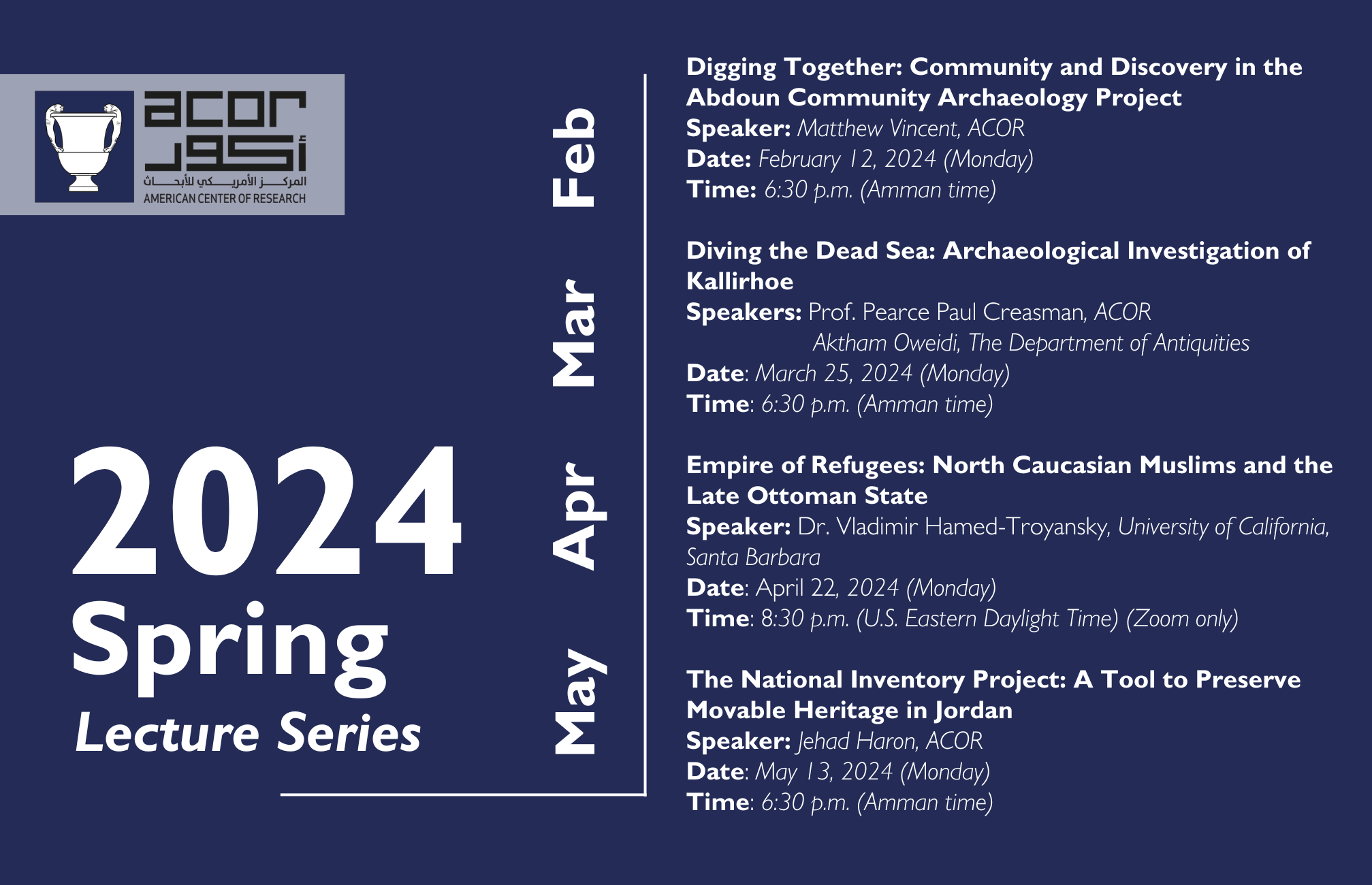
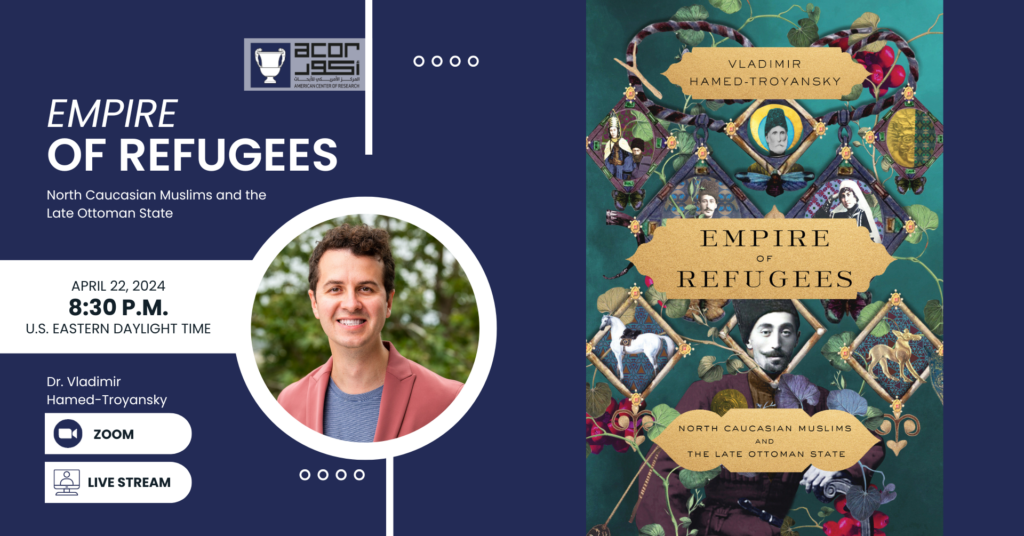
Empire of Refugees: North Caucasian Muslims and the Late Ottoman State
22 April 2024
8:30 p.m. U.S. Eastern Time
Join us via Zoom (Webinar ID: 861 0597 8029 — Passcode: 092768)
Watch the YouTube livestream
Video now available on our YouTube channel
In our next lecture, which will be presented only remotely on April 22, 2024, at 8:30 p.m. U.S. Eastern Time via Zoom and YouTube livestream, Dr. Vladimir Hamed-Troyansky will talk about his newly published book _Empire of Refugees: North Caucasian Muslims and the Late Ottoman State_ (Stanford University Press, 2024). In this compelling work, he discusses an historical narrative spanning the late Ottoman era, focusing on the influx of approximately one million Muslim refugees from Russia between the 1850s and World War I. These refugees, settling across the Ottoman Levant, Anatolia, and the Balkans, played a pivotal role in shaping the demographic landscape of the region. The contributions of Circassian and Chechen refugees extend beyond mere resettlement; they were instrumental in the founding of numerous villages, as well as three of the four largest cities in Jordan, among them Amman. Dr. Hamed-Troyansky’s research, drawing from extensive archival materials in Arabic, Ottoman Turkish, and Russian sourced from Jordan, Turkey, Russia, and beyond, sheds light on this often-overlooked aspect of Ottoman history.
_Empire of Refugees_ offers a fresh perspective, challenging conventional narratives surrounding migration and displacement in the Middle East. Through his analysis, Dr. Troyansky illustrates how the Ottoman government established a sophisticated refugee regime that preceded the formal frameworks developed later by the League of Nations and the United Nations. This pioneering work not only enriches our understanding of the late Ottoman period but also provides valuable insights into broader historical and contemporary issues of migration and refugee governance.
Dr. Vladimir Hamed-Troyansky is an historian of global migration and forced displacement and an assistant professor of global studies at the University of California, Santa Barbara. In addition to _Empire of Refugees: North Caucasian Muslims and the Late Ottoman State_ (Stanford University Press, 2024), he has written articles that have appeared in _Past & Present_, _Comparative Studies in Society and History_, _International Journal of Middle East Studies_, _Slavic Review_, and _Kritika_. He received his PhD in history from Stanford University, and during his graduate studies ACOR awarded him a Pierre and Patricia Bikai Fellowship (2013–2014) to examine court records from the Salt and Amman areas for insights into the social and economic life of refugees in Ottoman Transjordan. He has also been a postdoctoral fellow at Columbia University.
The speaker will be pleased to answer questions after the presentation.
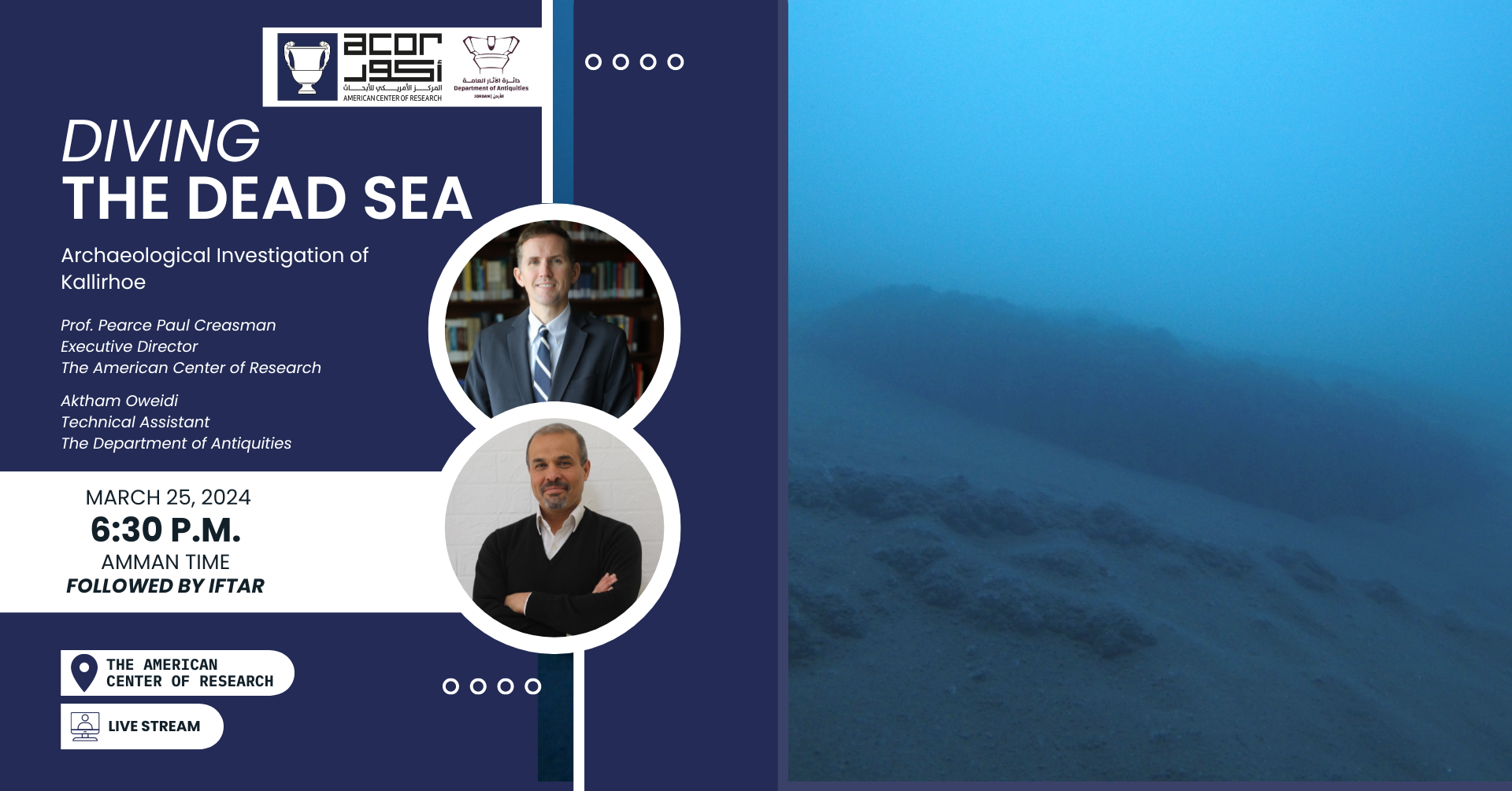
Diving the Dead Sea: Archaeological Investigation of Kallirhoe
a lecture by Pearce Paul Creasman and Aktham Oweidi
25 March 2024
6:30 p.m. (Amman) (followed by Iftar)
Join us in person at the American Center of Research (click for location and directions)
Join us via Zoom (Webinar ID: 863 3593 1197 — Passcode: 114446)
Watch the YouTube livestream
Video now available on our YouTube channel
In collaboration with the Department of Antiquities, the American Center of Research conducted a brief season of survey and exploratory excavation at the Dead Sea port site of Kallirhoe (modern ‘Ain ez-Zara) in fall 2023. The port, which served the citadel of Machaerus (Mukawer), dates from at least as early as the Hasmonaean period (1st century BCE), and its springs appear on the Madaba map (6th century CE). This brief illustrated lecture will describe the work performed on land and underwater as we sought to better understand the site through archaeology — including the first in-person underwater survey ever done in the Dead Sea, which presented logistical challenges and encountered unexpected conditions.
The lecture will be followed by Iftar at ACOR!
The speaker will be pleased to answer questions after the presentation.
Prof. Pearce Paul Creasman became executive director of the American Center of Research in February 2020, having come from the University of Arizona where he was a professor and curator starting in 2009 with a focus on the heritage, archaeology, and environment of the Middle East and North Africa. Starting in 2012, he served as director of the University of Arizona Egyptian Expedition. He has worked in several countries in the region, his most recent archaeological project being directing the excavations at the pyramids and royal necropolis of Nuri, Sudan, a UNESCO World Heritage Site. Dr. Creasman’ s formal training includes a PhD and MA in nautical archaeology from Texas A&M University, as well as graduate certifications in conservation and heritage preservation. He holds a BA from the University of Maine in anthropology and philosophy. With more than 100 publications to his credit, Dr. Creasman has been recognized for his work by several institutions, including the White House’s Office of Science and Technology Policy, and as a fellow of The Explorer’s Club and the Royal Geographic Society, and he was honored as a “Genius” in National Geographic’s 2021 almanac.
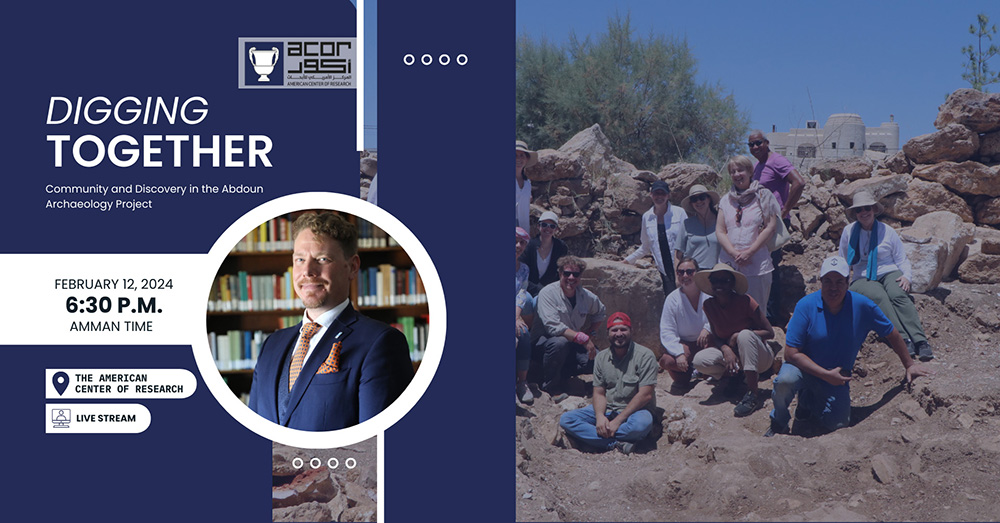
About the Speaker:
Digging Together: Community and Discovery in the Abdoun Community Archaeology Project
a lecture by Matthew Vincent
12 February 2024
6:30 p.m. (Amman)
Join us in person at the American Center of Research (click for location and directions)
Join us via Zoom (Webinar ID: 810 8859 7266 — Passcode: 736391)
Watch the YouTube livestream
https://www.youtube.com/watch?v=tcOzuW5NrssVideo now available on our YouTube channel
This lecture will share the story of the Abdoun Community Archaeology Project, a pioneering initiative that places community engagement at the heart of archaeological exploration. Founded in 2021 as a partnership between the American Center of Research and the Jordanian Department of Antiquities, the project serves as a place to deepen the involvement of members of the public with the rich history and heritage of the area. In other words, it is an opportunity for people to get their hands dirty! Under the close supervision of trained professionals, volunteers are welcomed to help understand and excavate the site. With a focus on ensuring that those who live around archaeological sites have an appreciation for historical structures and the past, the goal of the project is simply to see more people informed and involved.
In his lecture, Matthew Vincent will emphasize the project’s commitment to engaging local communities as active participants, creating a rich, shared experience while still emphasizing the archaeological process. He will also shed light on the recent discoveries made by the project, demonstrating how a community-focused approach can lead to meaningful and meticulous exploration of our past.
And he will be pleased to answer questions after the presentation.
About the Speaker:
Matthew Vincent joined the American Center of Research in October 2022 as a project co-director for the National Inventory Project. He has been involved with the archaeology of Jordan since 2004, when he joined his first excavation at Tall al-’Umayri. Since that initial season of work in Jordan, he has been looking for new ways that technology can serve cultural heritage, both for preserving our past for future generations and for advancing our ability to conduct research now.
2023 FALL LECTURE SERIES
(updated 22 November 2023)
We regret to inform you that the lecture scheduled for November 27 is postponed. Thank you for your interest. We look forward to gathering together again in the near future.
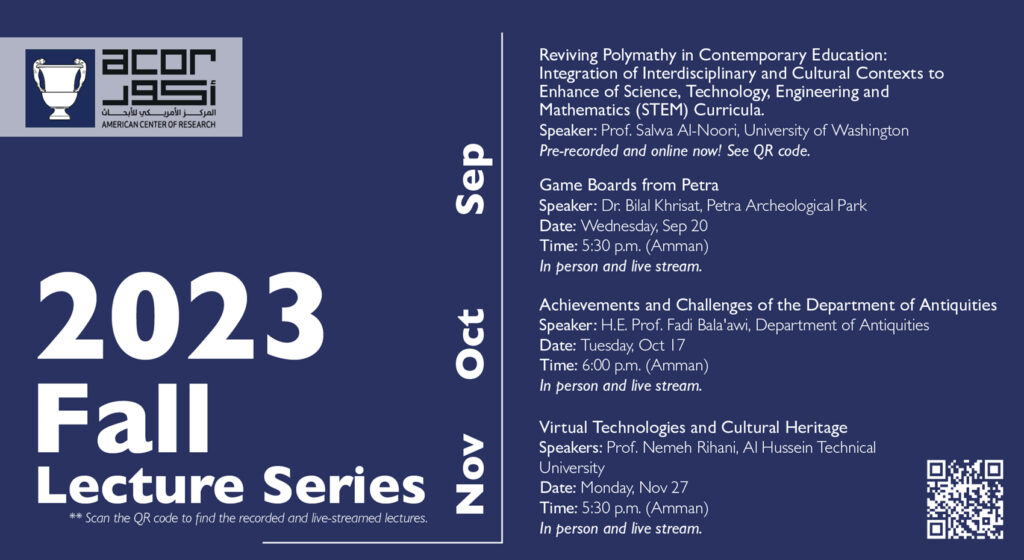
“Game Boards from Petra” by Bilal R. Khrisat
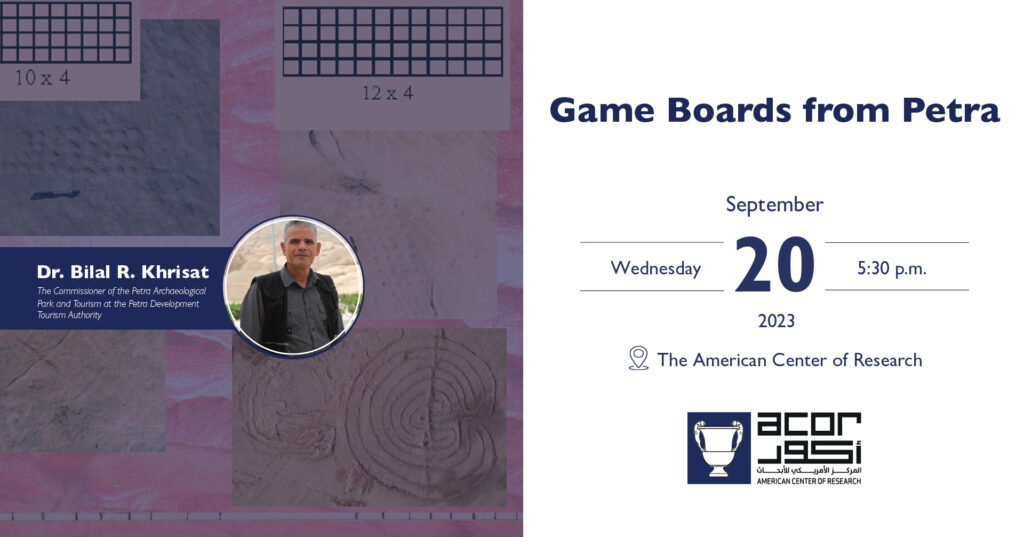
In this lecture, Bilal R. Khrisat, commissioner of the Petra Archaeological Park and Tourism at the Petra Development Tourism Authority, explores the significance of Nabataean board games in ancient Petra, shedding light on their place in the landscape and in social activities, while identifying avenues for further research. Archaeological and anthropological research highlights the impact of board games on human interactions, how they foster collaboration and skill development. The board games carved into rock surfaces in Petra offer a diverse array of strategic challenges. They evolved over time, reflecting regional variations and incorporating elements of skill and luck. The lecture emphasizes the importance of expanding research into these culturally significant games and preserving them to gain deeper insights into the past.
The lecturer will be pleased to answer questions after the presentation.
The lecture may be attended in person or via Zoom.
Please click the link below at the time of the lecture to join us remotely:
https://us02web.zoom.us/j/83296316562?pwd=ZHpHNmhBL1c5a0NubWVYbFBBaWM1UT09
About the speaker:
Bilal R. Khrisat has a PhD in geoarchaeology from Deccan College Post Graduate and Research Institute (India), an MA in eastern Mediterranean archaeology from Katholieke Universiteit Leuven (Belgium), and a MSc in applied geology from Savitribai Phule Pune University (India). Dr. Khrisat is presently the commissioner of the Petra Archaeological Park and Tourism at the Petra Development Tourism Authority (PDTRA). His main interests are the application of scientific methods to heritage and archaeology, documentation and management of archaeological sites, cultural heritage management, GIS applications, stone weathering and conservation, paleoenvironment and environmental issues related to heritage, landscape management, and cultural utilities of landscape, museums, and tourism issues. He has numerous publications and has presented research papers as a member of various professional bodies and organizations at many national and international conferences.
“Reviving Polymathy in Contemporary Education: Integration of Interdisciplinary and Cultural Contexts to Enhance Science, Technology, Engineering, and Mathematics Curricula” by Salwa Al-Noori
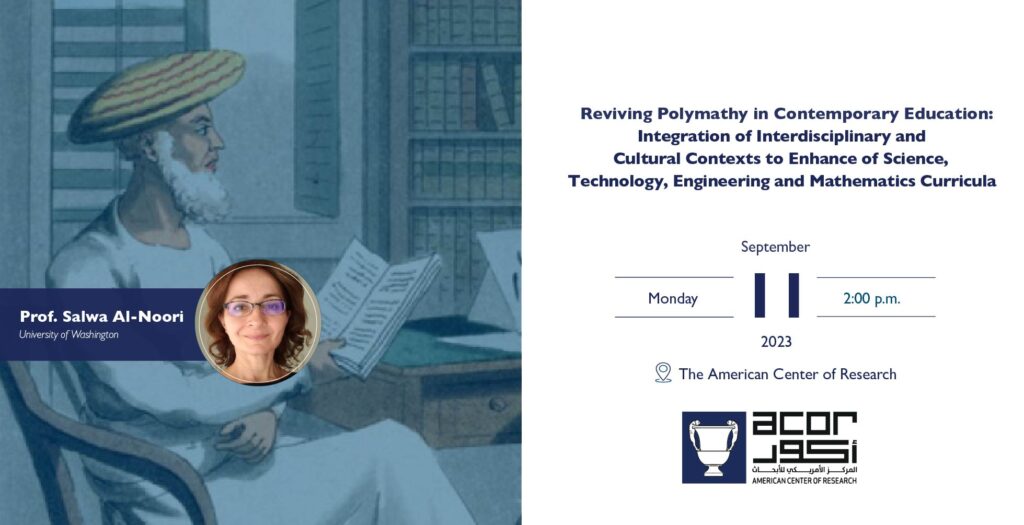
Autumn is just around the corner, and we are excited to announce our upcoming fall 2023 lecture series! To kick-start the season and set the tone for an enriching, interdisciplinary educational journey, we start with an inspiring pre-recorded talk by Salwa Al-Noori, associate teaching professor at the University of Washington: “Reviving Polymathy in Contemporary Education: Integration of Interdisciplinary and Cultural Contexts to Enhance STEM Curricula.”
Keep an eye on our schedule for upcoming lectures and mark your calendars!
About the speaker:
As a faculty member at the University of Washington, Prof. Salwa Al-Noori (PhD, neuroscience, Baylor College of Medicine) incorporates interdisciplinary, multi-perspective approaches to engage students in ways that make learning accessible and that advance diversity, equity, inclusion, and justice in STEM (science, technology, engineering, and mathematics) education. She has been a visiting Fulbright Scholar in the Jordan this past academic year, engaging in the exchange of pedagogical practices focused on promoting culturally responsive teaching in STEM education through international collaboration.
Watch the lecture on our YouTube channel.
The Aphrodite-al‘Uzza Conservation Collaborative
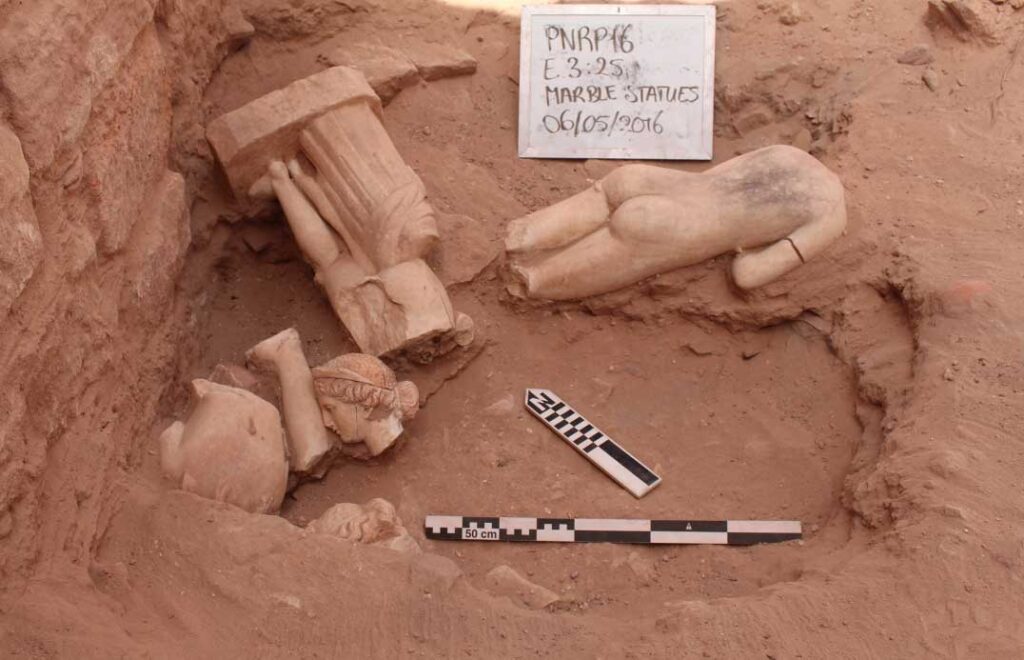
Tuesday, 2 May 2023, 9:30 a.m.–3:00 p.m. (UTC +3)
In person and online (with live Arabic translation)
American Center of Research, Seminar Room
Amman, Jordan
Archaeological excavations by the Petra North Ridge Project unexpectedly discovered two marble statues of Aphrodite at the ancient Nabataean capital prior to the COVID-19 pandemic. Found amidst 4th-century AD domestic debris, both sculptures preserve fragile remains of ancient painting (or polychromy) and are among the most important statues of imported marble discovered at Petra in recent decades. Their fragmentary condition and corroding interior iron pins (from multiple ancient repairs) have required a detailed multidisciplinary conservation treatment. This hybrid workshop includes presentations on the discovery of the statues and their ancient historical and cultural contexts and describes their recent conservation in preparation for their public exhibition in the Petra Museum. In-person and online attendees can interact (with live Arabic translation) in this collaborative space to discuss these important additions to the rich archaeological heritage of Jordan.
For the workshop program and a link register for this event, please click here to visit our announcement page.
2023 SPRING LECTURE SERIES
“Geology and Fossils from Jordan” by Abdalla Abu Hamad and Ikhlas Alhejoj
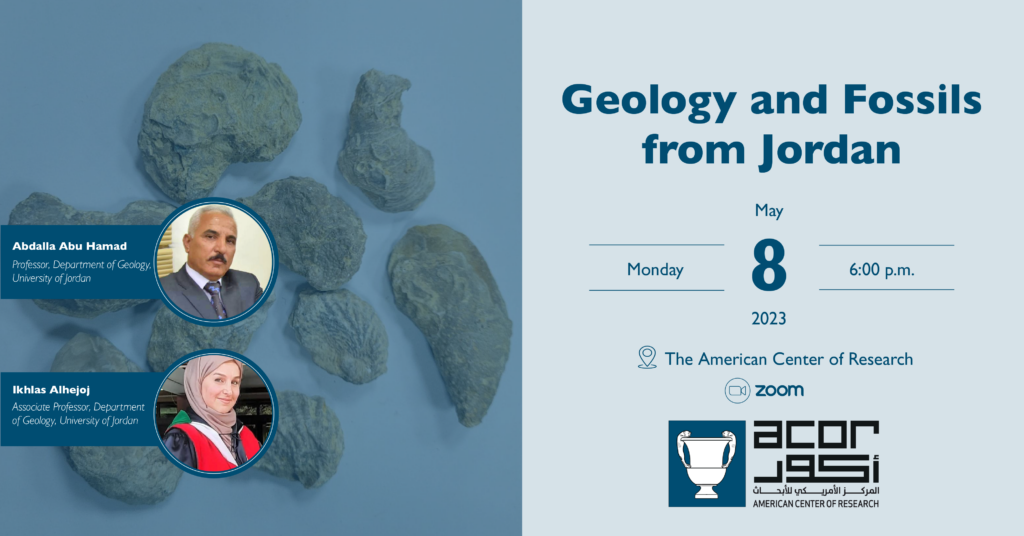
This lecture will shed light on Jordan’s geology, including the different lithofacies (observable components) of exposed rock sequences and the ages of these rocks. Moreover, it will look at some economically important deposits. Theories of the Jordan rift formation will be explained, and the structural position of Jordan as part of the Arabian plate will be demonstrated. Seismological data related to later earthquakes in the region will be discussed.
Some interesting vertebrate fossils from Jordan will be shown, focusing on footprints of Upper Cretaceous dinosaurs. The lecture will also feature invertebrates and other fossils, notably of Permian plants in the Umm Irna Formation.
The lecturers will be pleased to answer questions after the presentation.
The lecture may be attended in person or via Zoom. English/Arabic translation will be available via Zoom.
Please click the link below at the time of the lecture to join us remotely:
https://us02web.zoom.us/j/83509929010?pwd=OU5RdGJ0UXhUS0QvbGJKOFhSYTBtUT09
Passcode: 741413
About the speakers:
Abdalla Abu Hamad is a professor in the Department of Geology of the University of Jordan. He earned his PhD in paleontology/geology in 2004 from Hamburg University and the University of Muenster in Germany. His research interests focus on Permian paleobotany and paleo-wildfires to understand the impact of fire on Late Paleozoic paleoenvironments. He has published several papers, books, and a book chapter, and he organized the 14th International Permo-Triassic Workshop, held in Jordan in March 2017.
Ikhlas Alhejoj is an associate professor at the Department of Geology of the University of Jordan. She gained her PhD in Paleontology/Geology in 2013 from the Department of Geology and Environmental Sciences, Faculty of Civil Engineering, Karlsruhe University of Technology (KIT), Germany. Her research interests focus on Quaternary paleo lake deposits as applied to to paleoclimate and paleo environment studies and also on deformation meso-structures and their formation mechanisms. She is further interested in the use of floral and faunal species as bio indicators of environmental conditions. She has published several papers, books, and book chapters and has presented research papers at international and national conferences. She is a member of the European Society for Deformation Mechanisms, Rheology, and Tectonics, the Jordanian Geologists Association, the Scientific and Technical Research Association, and the Association of Jordanian Women Academics.
“Sustainable Tourism in the Middle East: Nature and Heritage Conservation” by Lubna Qaryouti
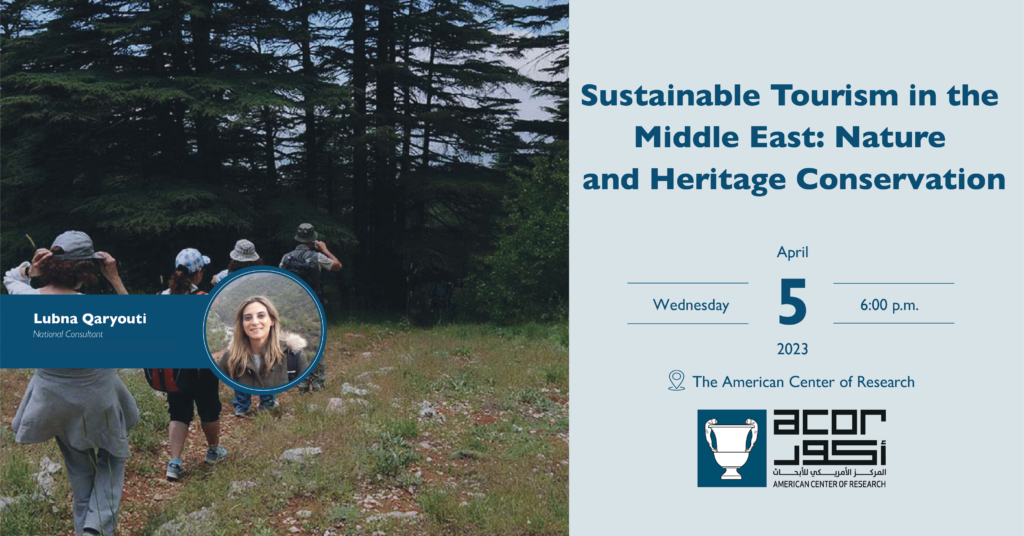
Several European Union projects have worked tirelessly to develop a new model for ecotourism development that brings together protected areas and the tourism industry in a way that benefits nature, cultural heritage conservation, and local communities, as demonstrated by a robust sustainability-monitoring system.
The purpose of this lecture is to introduce and replicate this new ecotourism model and create a membership network for protected areas committed to embracing a new method of boosting tourism in the Middle East.
Cultural heritage is an important component of ecotourism for which the key challenges are:
• Conservation and restoration of tangible cultural heritage;
• Protection and valorization of intangible cultural heritage;
• Appropriate recognition and interpretation;
• Creation of stronger links among cultural heritage, local communities, and nature.
Jordan and other countries in the region are rich in cultural heritage sites that have the potential to be central attractions in terms of ecotourism and to create stronger links among cultural heritage, local communities, and nature.
About the speaker: Lubna Qaryouti, a national of Jordan, works with UNEP, the United Nations Environmental Program, as a national consultant for the Nationally Determined Contributions (NDC) Action Project. Ms. Lubna holds a master’s degree in natural resources from the University of Arizona in Tucson.
“States of Subsistence: The Politics of Bread in Contemporary Jordan” by José Ciro Martínez
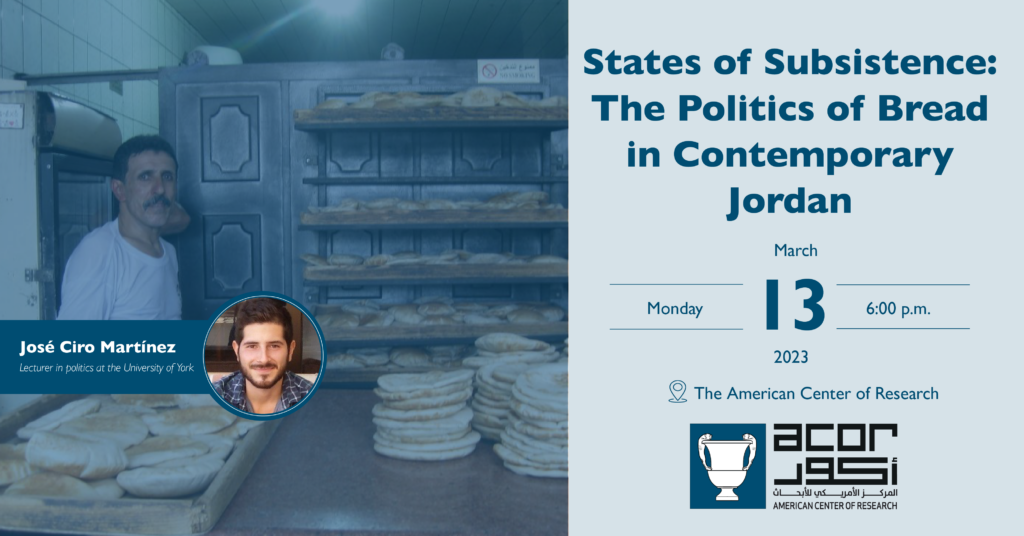
On any given day in Jordan, more than nine million residents eat approximately ten million loaves of khubz ‘arabi—the slightly leavened flatbread known to many as pita. Some rely on this bread to avoid starvation; for others it is a customary pleasure. Yet, despite its ubiquity in accounts of Middle East politics and society, rarely do we consider how bread is prepared, consumed, discussed, and circulated—and what this all represents.
Drawing on more than a year working as a baker in Amman, Martínez probes the practices that underpin subsidized bread. Following bakers and bureaucrats, he offers an immersive examination of social welfare provision. Martínez argues that the state is best understood as the product of routine practices and actions, through which it becomes a stable truth in the lives of citizens. “States of Subsistence” not only describes logics of rule in contemporary Jordan—and the place of bread within them—but also unpacks how the state endures through forms, sensations, and practices amid the seemingly unglamorous and unspectacular day-to-day.
2022 FALL LECTURE SERIES
“The Jordan Museum: More Than 10,000 Years of Human Resilience and Innovation” by Ihab Amarin
Cultural and Linguistic Diversity of Ancient Jordan as Gleaned
from the Epigraphical and Written Sources
التّنَوع الثّقافي واللغوي للأردن القديم كما هو مستوحىً من النّصوص والكِتابات الأثرية
محاضرة بالتعاون مع دائرة الاّثار في الأردن
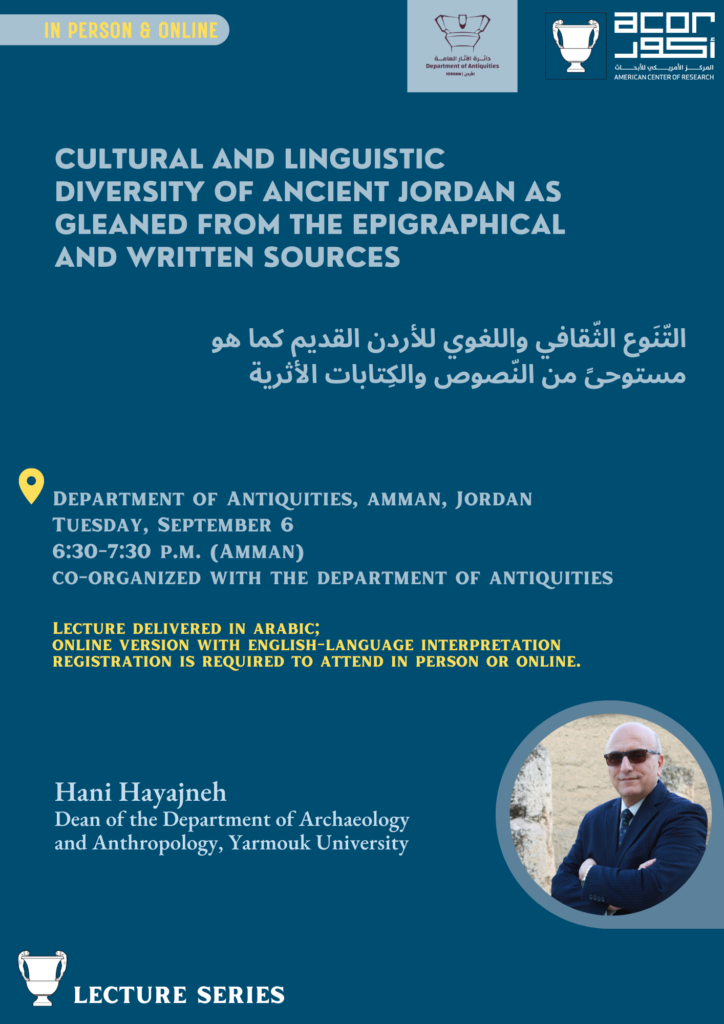
Date: Tuesday, September 6, 2022
Location: Department of Antiquities, Amman, Jordan
Time: 6:30–7:30 p.m. GMT+3 (Amman)
11:30 a.m.–12:30 p.m. EDT
Registration is required to attend either in person or remotely. In-person attendees must present their confirmation ticket and wear a face mask during the lecture.
The lecture will be delivered in Arabic and will also be livestreamed on Zoom with English-language interpretation.
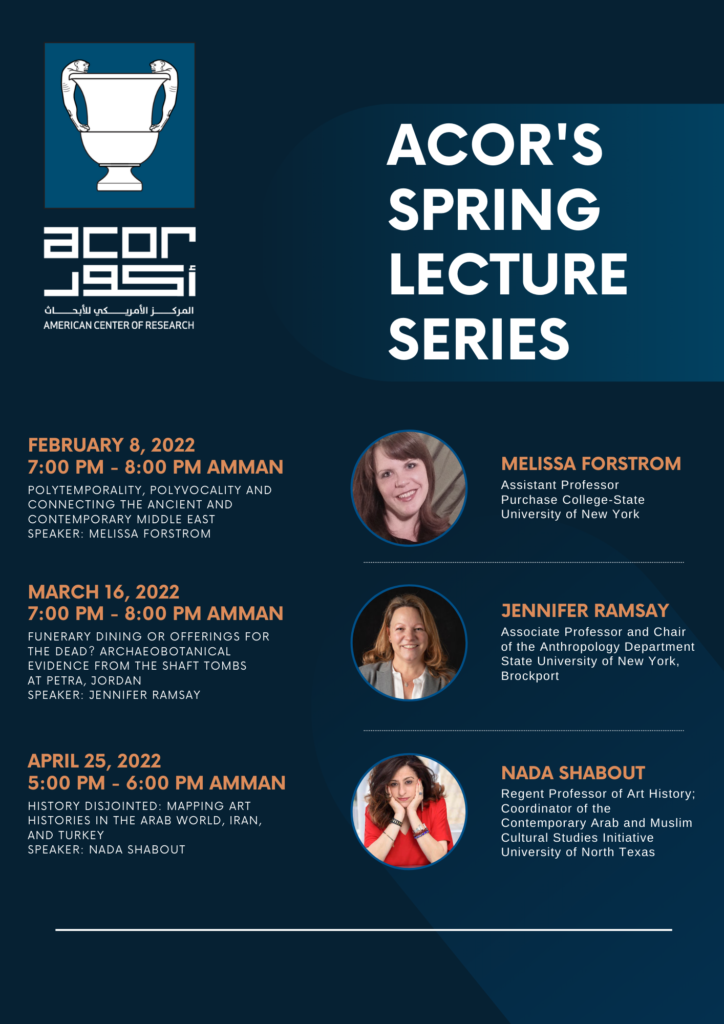
2022 SPRING LECTURE SERIES
“History Disjointed: Mapping Art Histories in the Arab World, Iran, and Turkey”
Monday, April 25, 2022 at 5:00 p.m. Amman local time / 10:00 a.m. EDT
With the increasing interest in the modern and contemporary arts of the Arab World, Iran, and Turkey, the need for the field’s historiography is vital. As it stands now, it seems that this historiography is being developed mostly in the diaspora. The imbalance of this situation prompts inquiry into the state of the discipline of art history in the region. Throughout the Middle East and North African region there are many academic art programs in institutions of higher education that have been training generations of artists and educators. While some have a long history, others have been initiated only recently.
The ongoing Mapping Art Histories in the Arab World, Iran and Turkey project aims to compile information about teaching art history across 14 countries in the region and make that data available for scholars, researchers and students in order to develop a better understanding of global art history. Funded by the Getty Foundation’s Connecting Art Histories initiative, the project works toward a more inclusive understanding of how art history is perceived and art historiographies in the region is negotiated. This presentation initiates a space to discuss challenges both practical and theoretical, as well as comments on the state of the field and its definitions and episteme. It unpacks the role of art history as a discipline within the region, connecting disciplinary initiatives within the region and diaspora, and contributing to continuing discussions on the possibilities for decolonizing art history within the academy and beyond.
About the speaker:
Nada Shabout is a Regent Professor of Art History and the coordinator of the Contemporary Arab and Muslim Cultural Studies Initiative (CAMCSI) at the University of North Texas. She is the founding president of the Association for Modern and Contemporary Art from the Arab World, Iran and Turkey (AMCA) and founding director of Modern Art Iraq Archive. She is a curator and author of numerous essays and books and is currently working on a new book and project, “Demarcating Modernism in Iraqi Art: The Dialectics of the Decorative.” Shabout is on the board of directors, Visual Art Commission, Ministry of Culture, Saudi Arabia; the board of The Academic Research Institute in Iraq; and the College Art Association (CAA) board of directors (2020–2024). She received the 2020 Kuwait Prize for Arts and Literature from the Kuwait Foundation for the Advancement of Sciences.
“Funerary Dining or Offerings for the Dead? Archaeobotanical Evidence from the Shaft Tombs at Petra, Jordan”
Wednesday, March 16, 2022 at 7:00 pm Amman local time / 12:00 noon EST
There is extensive evidence from Hellenistic and Roman literary sources for the practice of funerary dining and the provisioning of offerings to the dead. Mortuary behaviors have generally relied on ceramic and faunal remains but rarely are they explored using evidence from plants. This lecture seeks to gain a better understanding of the role of plants in this type of ritual context through the analysis of botanical remains recovered from Nabataean tomb contexts in Petra. Analysis of samples taken from several tombs that were excavated over three seasons (2012, 2014 & 2016) indicates the presence of a variety foodstuff such as Triticum sp. (wheats), Hordeum vulgare (barley), Lens culinaris (lentil), Vitis vinifera (grape), Ficus carica (fig) and Phoenix dactylifera (date). These finds provide intriguing evidence of plants consumed or offered to the dead during ritual events. This study, in association with the analysis of bioarchaeological remains and ceramics, expands our knowledge of Nabataean funerary practices and contributes to a broader understanding of the role of plants in ritual funerary events in the ancient world.
About the speaker:
Dr. Jennifer Ramsay (Ph.D. in 2008) is Associate Professor and chair of the anthropology department at SUNY Brockport (State University of New York). Jennifer received the Archaeological Institute of America’s Excellence in Undergraduate Teaching Award in 2019 and two State University of New York (SUNY) Chancellor’s Awards for Excellence in Teaching (2014) and Excellence in Faculty Service (2020). Her area of expertise centers on the use of archaeobotany, subsistence reconstruction, trade patterns, environmental change, and land-use patterns to gain insight into lifeways of past societies. Although she specializes in the Roman and Late Antique world, Jennifer has also analyzed and published plant material from the Neolithic, Bronze and Iron Ages, and Islamic periods. Over her career, she has participated in many archaeological excavation projects in Jordan, Israel and Italy at such sites as Petra, Pompeii and Caesarea Marittima.
“Polytemporality, Polyvocality and Connecting the Ancient and Contemporary Middle East”
Tuesday, February 8, 2022, at 7:00 p.m. Amman local time / 12:00 noon EST
Museums are being called upon to become more relevant, address contemporary concerns, relinquish neutrality, and abandon the fallacy of timelessness. Consequently, in the United States there has recently been an increase of art exhibitions that specifically respond to or represent contemporary affairs. Specifically, interpretation in art exhibition from the Middle East (whether ancient, Islamic, modern, or contemporary) has been used to address these concerns in exhibition spaces. This is both unique and surprising because it works against the long-held belief that museum visitors are removed from the concerns of their daily lives, because it surrenders any claim to museum neutrality, and because the inclusion of contemporary affairs has the potential to alienate funders and audiences.
Employing a structural justice approach, this lecture examines the role of exhibition interpretation and the possible effects of polytemporality and polyvocality in The World Between Empires: Art and Identity in the Ancient Middle East (March 18–June 23, 2019) at the Metropolitan Museum of Art. Rooted in interpretation theory and new museology and drawing on exhibition visits and interviews with curators, this talk argues that the future relevance in art-museum exhibition could be in interpretation, which is critical to the accessibility of an exhibition, responsible for the meanings audiences create, and is essential in linking the familiar with the unfamiliar.
About the speaker:
Melissa Forstrom, PhD, is an assistant professor at Purchase College-State University of New York, where she teaches museum studies and arts management courses. Recently, she coedited and contributed to Museum Innovation (Routledge, 2021), has authored a handful of academic chapters and articles, and is under contract with Routledge for a monograph titled Interpreting Islamic Art in Europe and the United States (forthcoming, 2023). Melissa has been an invited lecturer at the University of Leicester and University of Oslo, among many others. Having presented her research at conferences in the USA, UK, Germany, Singapore, and Russia, she has also been invited to speak at numerous art institutions. Her doctoral dissertation (University of Westminster, 2017) investigates the reinstallation and interpretation of Islamic art exhibitions in Europe and the United States.
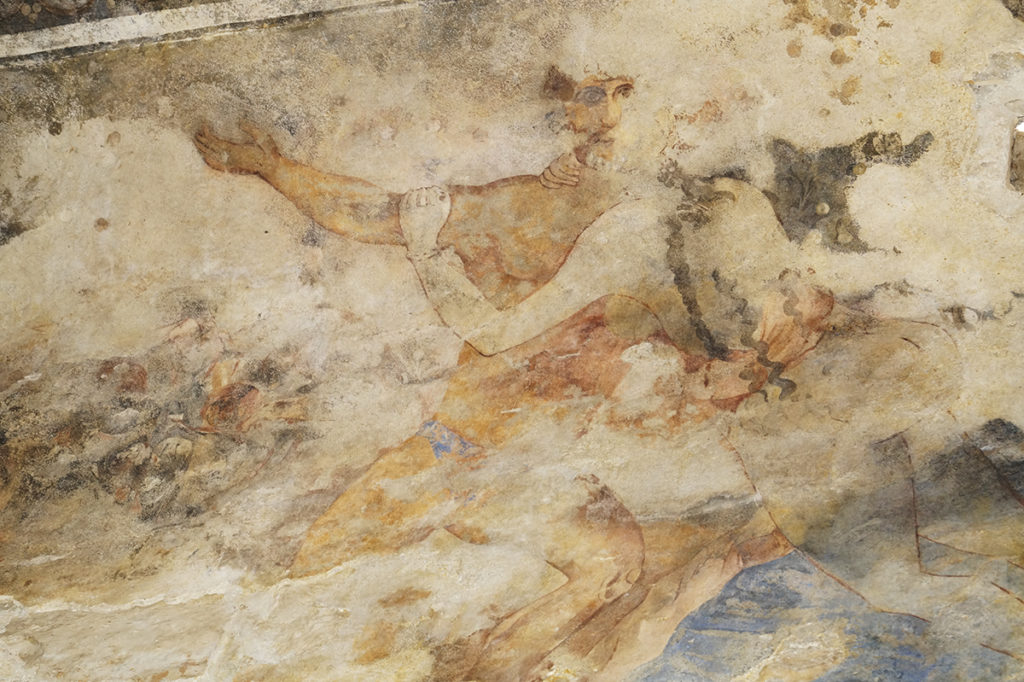
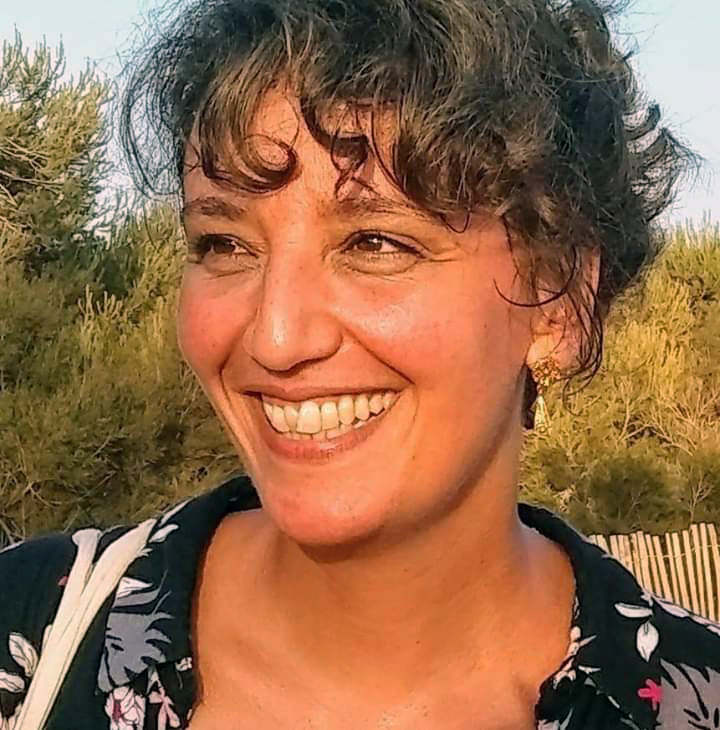
“Qusayr ‘Amra: The Pandora’s Box of Early Islamic Aesthetics”
Tuesday, November 9, 2021, at 7:00 p.m. Amman local time / 12:00 (Noon) p.m. EDT
This lecture has already occurred.
Since its discovery in 1897, the early Islamic bath house of Qusayr ‘Amra (Jordan; AD 730s) has been celebrated for its figural wall paintings, the meanings of which have been much debated. Following the spectacular discoveries of new images after the recent cleaning of the paintings, Nadia Ali has identified scenes inspired by the Aethiopica, a 4th-century romance composed by Heliodorus, a Syrian outsider from Emesa (modern Homs) assimilated within Greco-Roman culture. Taking this discovery as its starting point, the lecture looks in two directions: forward, to new and emerging ways to examine images and texts together, and backward, to earlier efforts expended in understanding the paintings. It thus aims to illuminate a history of what Qusayr ‘Amra has been, as well as to generate a new vision of what it might become.
About the speaker: Nadia Ali is an associate researcher based at the IREMAM, University of Aix-Marseille, and studies the emergence of early Islamic art in the context of late antiquity. She was trained in art history, Islamic studies, and Arabic at the University of Aix-Marseille. Her educational and professional background spans France, the Middle East, the USA, Germany, and the UK. From 2018 to 2020, she was a faculty fellow at Silsila: Center for Material Histories (New York University). Before that, she was a postdoctoral researcher in the five-year Empires of Faith project based at Oxford University and the British Museum (2013–2018). She has just completed her first book, provisionally entitled Qusayr ‘Amra: The Pandora’s Box of Early Islamic Aesthetics, and she is currently working on a new book project, which has been in progress on and off for a decade now: Potent Images in Late Antique Arabia.
Online lectures on demand
Did you know ACOR has dozens of recordings of past academic presentations, available for free on our YouTube channel? Click here to see our video list, including short presentations from virtual academic conferences (e.g., ASOR and MESA) as well as feature lecture events previously held at ACOR in recent years.
